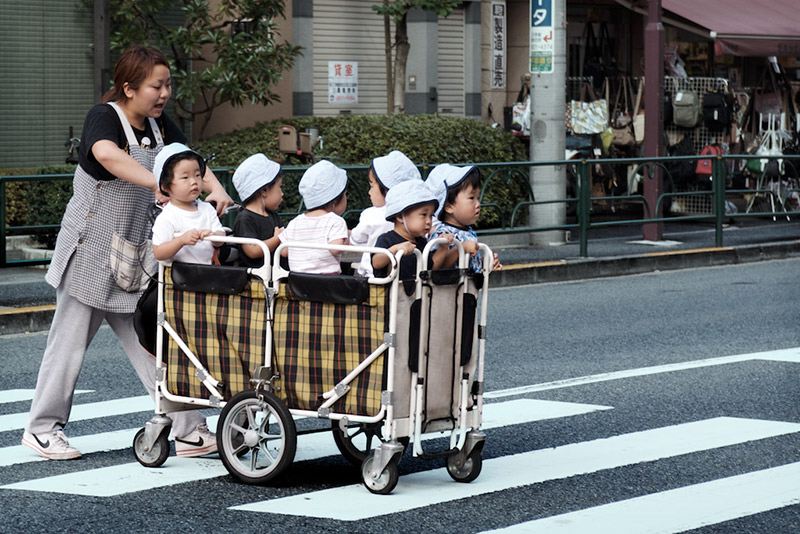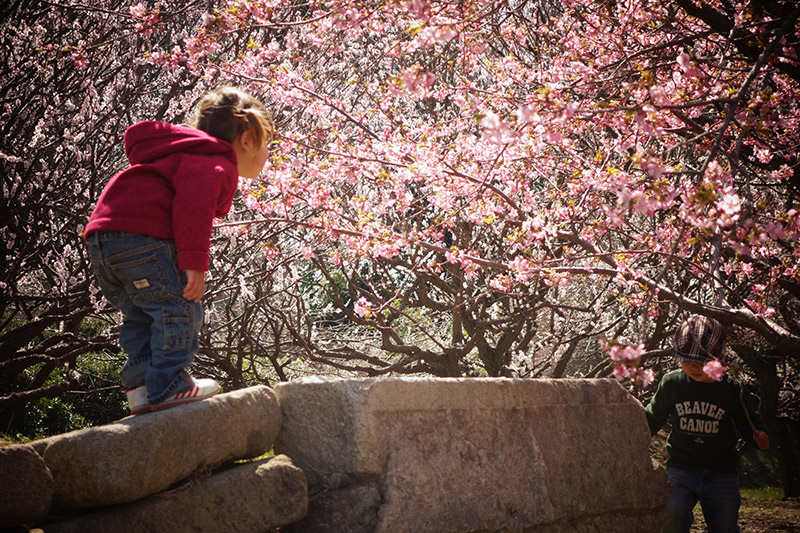If you're an adult in your home country, you have an idea of who you are, how others see you, and how to act in a way that reflects how you want to be treated.
However, when living abroad in a country whose language and culture is foreign to you, you almost become a child again. Things you could do on your own become difficult. Actions that once might give subtle hints at your personality can be interpreted in vastly different ways. It's difficult to express yourself in a way that reflects how you want to be seen. Even people who master the language may lack cultural knowledge to make that language work for them. And that's just the start. Sometimes, your own body may not act the way you're used to due to the climate or new diet.
In short, you become a child again.
While some people cling to their old culture and reject the thought of starting anew, others embrace it and foster their foreign-self, cultivating their foreign identity. You can get mad and throw fits like a real child, which works in getting your way sometimes. We all want to be more mature than that though and to become mature in Japan, you have to become a child.
Accepting You're a Cultural Child

I hinted at this article before, but let me be up front again: I hate asking for help or explanations. In my home culture, I may still ask for advice, but in general, people tend to come to me. I can interpret complex legalese, offer help with editing, do simple home repairs or know someone who can (thanks Dad!).
In Japan? I struggle with getting people to believe I only need one bag for the souvenirs I'm buying. I'm asked to participate in cultural events and practices I don't understand. I have to play games to get co-workers to cooperate. It feels like everyone has to teach me or explain things to me so I can function in this society.
And that's the key to building up your foreign-self: admitting that you're a child that needs to learn.
In Japan, I know I come off as a child because I'm always asking why. Why do we celebrate this holiday? Why doesn't anyone look at the person who is speaking? Why is the whole meeting being read off a sheet we can read ourselves? Often, people just say, "That's how it's done," or, if I'm lucky, "Oh, I never thought about that." Clearly, I'm asking things that most people see as natural at this point in their life. In this sense, my foreign-self is a child, and I'm usually comfortable with that. However, there was a point that this wasn't the case, and it took some major puking to get me comfortable with my childlike foreign self.
When I first moved here, I thought I was a healthy adult and could adapt to anything that happened. I could find a way to be me all on my own. I didn't need help, especially with something as basic as dealing with a new climate.
I was horribly, horribly wrong. Over the New Year holiday break, my health situation came to a head. I'd been sick in Japan before, but luckily it was just something on the weekend, or during an extended break. I usually bounced back. In the states, getting sick was easy for me to cope with, and usually something minor I could even go to work with. However, this time, I was in a foreign country with severe vomiting (from both ends) in a busy train station, with no toilet paper or tissues.
It's embarrassing to not have full control over your body when you're an adult, and the idea of having issues I usually associated with children was deeply shameful. I had a very real need to grow up, but that deep sense of shame had been preventing me from addressing it.
Letting Go of Your Shame

At some point, you'll be faced with a decision: embrace your foreign self, admit that part of it needs help developing, and begin working on it. OR! Hate the country you're in, scream that the culture is weird, and ignore the fact that you are perceived in a different way due to your foreignness and surrender that identity to the masses trying to come to grips with who this foreign person is and what they think they're doing.
I was faced with this decision in Osaka station on December 30. My Japanese had failed me several times that day, or people had gotten suddenly shy on me. I was having an off day, and then the sickness happened. I didn't call home or tell anyone though. I just popped some American medicine and thought I could last the rest of the day on my own.
There I was, alone in Osaka with what I thought was just a stomachache. Again, I'm very private, I hate attention, and I hate feeling vulnerable, but my situation quickly developed in a very obvious manner. What took me 10 minutes walking when I was healthy suddenly took an hour going from bathroom to bathroom down the street, trying to empty out all I could in order to hopefully just "be normal" for a train ride home. I got on the first train, took some medicine, and got off at Osaka station. I thought I was fine. I was going to make it. I'd just go home and sleep it off and no one would know what happened. They'd just think I was tired. And that's when it all hit me at once.
I felt "the urge," the need to be in the bathroom right then and there. I was lucky enough to be a few feet from one, but not lucky enough to choose the right stall. Despite how busy it was, the sound of me emptying my body from the top and bottom was morbidly obvious. The terrible echo of my body's cries for help (or so it seemed) began to drown out the formerly bustling restroom, making things comparably dead silent for a busy station. I felt a little relieved at first, and thought my ordeal was at an end. That's when I realized my error: the stall had no toilet paper.
Bathrooms in Japan usually have a second roll right next to the first one, just in case something happens. That roll was empty. In Tokyo, people are always giving you free samples of tissues, but I'd used the ones I'd amassed before coming to Osaka when I'd cleaned my face from a few earlier "incidents." I was paper-free, but in dire need.
This was my moment, and I pray that, when yours comes, it's not nearly as embarrassing. After spending a day severely questioning my Japanese skills, I realized I'd have to shout for toilet paper in the crappy Japanese that was either failing me or causing Japanese people to fear me. I had seriously thought about just waiting until "stuff" dried so I could limp back to my family friends in shame, but wasn't sure I wanted to do that in quite so pathetic a manner.
There are other times you may experience something similar. Moments where your adult self is challenged by the way people view your underdeveloped foreign-self. I'd had students openly disobey me in the classroom, staff ignore me and panic in Japanese while I was speaking Japanese to them, or, as I've said, had people question my perfectly understandable Japanese because it was at odds with their cultural knowledge of what people usually do. Heck, I found out that lying could be the best (and most appropriate) way out of certain situations.
Now, I could have gotten angry every time this happened, including when I had to shout for toilet paper and hope that "shy" Japanese people would understand my pain. It might have even worked for some occasions. However, for the most part, what worked was reminding myself that I was the different one. I was the foreigner, the cultural child, and I had to learn the right way to do or say something. That meant I had to ask for help, and while I could do it for some situations, it was still one thing that I really hated doing, particularly for such a personal topic.
Embracing Your Foreign-Child Status and Learning to Adapt

So you let it happen. You do what's super embarrassing. You ask how to say, "condom" in Japanese. You ask how to get students to listen to you in class. You yell and ask for toilet paper in a super busy train station until you either said things in a way correct enough to get help or shouted when the right person was nearby. It doesn't matter. What matters is you ask for help. You show you are vulnerable and, especially in Japan, you get help.
In Japan, being a foreigner, even a foreigner who knows the language and culture, you're afforded the right to ask for help. The Japanese do the same with their "onegaishimasu." People debate about the Japanese being child like, but it doesn't matter. What matters is that, in my experience, even when it may seem overbearing or racist, Japanese people want to help.
When you're ashamed or embarrassed, ask a question you know is rude but need answered. The lesson will stick. "Toire peipaa onegaishimasu" will get you TP. I won't forget that. Tattling on a rude student will get that kid chewed out. And, well, "sukin" (skin) can certainly have a different meaning in Japanese I won't be forgetting.
A Curious Kid

Not all the situations I learned from were terrible. Several of the articles I've written here have come from my extremely rude questions about how and why things work in Japan. I can ask these questions because, like a curious kid, Japanese people want to educate me. Even though I get some conflicting information, it's okay. Like the adult I am in my own culture, I know I have to sift through my experiences and use what seems to be the most common, most effective, and most trustworthy.
This article isn't a hard and fast set of rules but a guide, a plea to listen and ask questions before you judge or react. Doing that, and applying it to my daily life certainly helps make me not only seem like less of a man-child, but helps me build my adult persona in Japanese society.
